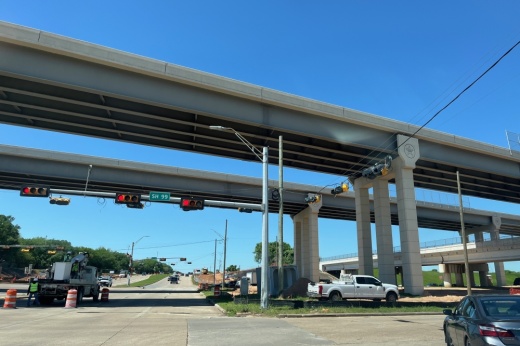When the Grand Parkway will extend from Sugar Land into Brazoria County is unclear, with management of the road’s remaining development split between Fort Bend County, Brazoria County and the Texas Department of Transportation.
While TxDOT officials plan to begin work on a segment in Brazoria County in 2027, Fort Bend County officials said they’re prioritizing other toll road extensions before starting the county’s segment that would connect TxDOT’s segment to the rest of the Grand Parkway, or Hwy. 99.
In a nutshell
Houston’s third outer loop spans from south of Hwy. 59 in Sugar Land to its end near Mont Belvieu in east Houston. The undeveloped segments C and B would extend the Grand Parkway from Sugar Land to I-45 in League City.
Both segments are part of the Houston-Galveston Area Council’s 2045 Regional Transportation Plan finalized last spring. The RTP is a long-term regional plan for federal and state funding, said Adam Beckom, project programming and delivery manager with H-GAC.
In case you missed it
TxDOT officials announced in February 2023 the agency reached agreements with Galveston and Brazoria counties to begin the first portion of Segment B, called B-1, from I-45 to FM 2403 in Alvin. TxDOT officials anticipate construction on the B-1 section will begin in the first half of 2027 and take roughly four years to complete, TxDOT Public Information Officer Danny Perez said in an email.
Funding is also earmarked for Segment B-1 in the H-GAC’s preliminary 2025-28 Transportation Improvement Plan, unveiled April 3. The TIP is a four-year outline for roadway and public transportation projects that have been approved for federal and state funding.
What we know
However, the H-GAC hasn’t yet earmarked funding in the TIP for Segment C from Sugar Land to Hwy. 288 in Pearland. This is because Fort Bend County has primacy, or first dibs, to construct, operate and fund the segment, TxDOT Public Information Officer Kristina Hadley said in an email.
“Fort Bend County could choose to waive primacy for this segment of [Hwy.] 99, as other counties have done for other segments of [Hwy.] 99,” she said in an email. “TxDOT could then elect to take on that authority to develop the project.”
Officials with Fort Bend County’s engineering department declined to comment on the Segment C project.
Similarly to Fort Bend County, Brazoria County has retained primacy for the rest of Segment B, called B-2, from FM 2403 to SH 288, Perez said. TxDOT officials previously said the agency and Brazoria County will assess the time frame of Segment B-2 as a separate and future project, Community Impact reported.
"We are all partners in the regional mobility improvements that lead to reduced congestion, enhanced safety and cleaner air quality," Perez said in an email. "We maintain an open dialogue with the counties about 'our plans' and their plans in order to have a greater feel for the overall plan. However, we can only speak to our specific plans."
The backstory
In the past, TxDOT entered into agreements with other Houston-area counties to build and manage most of the Grand Parkway, Hadley said. However, Fort Bend County took on maintaining part of Segment D, which runs between Sugar Land and I-10 in Katy.
The Fort Bend Grand Parkway Toll Road Authority—also known as the Fort Bend County Toll Road Authority—spent $163.5 million of toll road funds in the early 2010s to build tolled main lane bridges between FM 1093 in Fulshear and Hwy. 59 in Sugar Land, said Lisa Castañeda, deputy operating officer with Mike Stone Associates, which manages the FBCTRA.
Additionally, Fort Bend County spent $5.7 million in 2016 to construct part of Segment C from Hwy. 59 south to about Rabbs Bayou, Castañeda said.
What to expect
As of now, Fort Bend County officials intend to eventually build and maintain Segment C, Castañeda said. Previous FBCTRA projects have been funded solely by toll road revenue and bonds, rather than state and federal funding.
“We're very aware TxDOT is looking at [Segment] B-2—we talk to our TxDOT partners and the other people with the Grand Parkway—but right now, all push and focus for the next big chunk of money we're gonna spend is for the Fort Bend Parkway,” Castañeda said.
In addition to the Grand Parkway, the FBCTRA also manages the Westpark Tollway and Fort Bend Parkway Toll Road. The most recent Fort Bend Parkway Toll Road extension to Sienna Ranch Road opened in November, and FBCTRA will complete an alignment study by December for future segments to Hwy. 36, Castañeda said.
“That’s focus No. 1, and that’ll take us the next few years,” she said. “Then after that’s in place, we’ll see what the demand is for the Grand Parkway. Right now, the demand to get the Fort Bend Parkway is greater than to finish the Grand Parkway.”
Fort Bend Parkway Toll Road will also one day intersect with the future Grand Parkway. Until then, Castañeda said FM 762, a north-south corridor running from the Grand Parkway's end to FM 1462 near Brazos Bend State Park, could be a “decent alternative” to connection between the Grand Parkway segments in Fort Bend and Brazoria counties.
Stay tuned
In the meantime, Castañeda said the FBCTRA is tackling other local Grand Parkway projects, including:
- Spending roughly $57.2 million to add direct connector lanes between the Westpark Tollway and Grand Parkway in the Katy area, finishing this year
- An upcoming estimated $89.9 million to add auxiliary lanes for entrance and exits between West Airport Boulevard and FM 1464 to ease congestion, beginning in 2025





